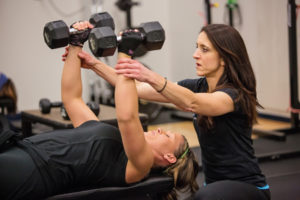The benefits of getting a good night’s sleep are rarely debated. Most evidence suggests adults need 7-9 hours; however, the exact number varies based on the individual. Sleep allows for recovery, repair, and restoration of physiological and psychological functions. Can it also be critical to exercise performance and what you get out of your workouts? The answer is not so clear; let’s explore more.
Physiological Role of Sleep
As stated above, sleep acts as a period of recovery, during which hormones responsible for regeneration and repair of tissue (such as growth hormone) are released. This, coupled with the still state of the body, results in the perfect combination of factors to allow the body to restore itself from daily wear-and-tear. In addition to allowing for tissue recovery and repair, emerging research seems to suggest that sleep aids in draining waste product from the brain into the lymphatic system (the body’s garbage disposal). This, along with other neurophysiological changes, results in improved cognitive function and mood.
Sleep and Response to Exercise
The military has conducted much of the research on sleep deprivation to determine minimal sleep needs of soldiers; nevertheless, we can learn something from this research (albeit inconclusive).
Some research suggests that sleep deprivation results in a blunted fight-or-flight hormone response. This would result in lower exercise heart rate, lower core temperature, and decreased mobilization of fuels (fat and carbohydrate); all of this can impair exercise performance. This response has been observed in some, but by no means, all of the research. Most research still suggests that hyperventilation occurs more rapidly in individuals who are sleep deprived; this too would impair exercise performance. Finally, impaired growth hormone secretion, as a result of sleeplessness, can affect recovery and thereby exercise performance. However, not all research suggests this phenomenon occurs consistently.
What is of less debate, is that sleep deprivation does lead to higher rates of perceived exertion when exercising. Indeed, people perceive exercise to be harder when they are sleep deprived, and as a result, tend to terminate exercise sooner. This finding appears to be more consistent through out the research. Although the precise mechanism has not yet been identified, the results seem to be clear; well-rested individuals are in a better mental state to perform exercise.
Recommendations
If you are looking to get the most out of your workout program in terms of performance and body composition improvement, 7 hours seems to be a critical threshold. If nothing else, 7 hours of sleep per night ensures that perceived exertion and psychological tolerance for exercise remain high. This will help push you through higher intensity workouts. Also, try to keep sleep patterns consistent. Keeping your biorhythms consistent will aid in the release of growth hormone (at night) and testosterone (early morning), which aid in recovery and performance.
About the Author:
-

Michael Stack is the founder & CEO of Applied Fitness Solutions and Frontline Fitness Pros. He is a faculty lecturer for the University of Michigan’s School of Kinesiology. He is also the creator and the host of the Wellness Paradox Podcast, produced in conjunction with University of Michigan.
Michael is an exercise physiologist by training and a health entrepreneur, health educator, and fitness industry advocate by trade. He is dedicated to enhancing the standard of practice of, and advocating for, fitness and wellness professionals to ensure they become an essential constituent in the healthcare delivery system.
With a career spanning over three decades in fitness, health, and wellness Michael has a deep knowledge of exercise physiology, health/wellness coaching, lifestyle interventions to mitigate chronic disease and leadership. He is credentialed through the American College of Sports Medicine (ACSM) as an Exercise Physiologist (ACSM-EP), Exercise is Medicine practitioner (ASCM-EIM), and a Physical Activity in Public Health Specialist (ACSM-PAPHS). Michael is a National Strength & Conditioning Association (NSCA) Certified Strength & Conditioning Specialist (CSCS), and a CDC Diabetes Prevention Program (DPP) Lifestyle Coach.
Michael received his undergraduate degree from the University of Michigan’s School of Kinesiology in 2004 and is currently a Master’s of Public Health (MPH) candidate at University of Michigan, with a specific concentration in health behavior and health education.
Michael is a board of directors’ member for the Physical Activity Alliance and Michigan Fitness Clubs Association. He sits on the University of Michigan’s School of Kinesiology Alumni Board of Governors. Michael is an expert curriculum reviewer for the American College of Lifestyle Medicine. Finally, he is a member of the executive leadership team for American Heart Association’s Heart Walk.
Michael lectures nationally for several health/fitness certification and continuing educations, including; IHRSA, the Medical Fitness Association, the National Strength & Conditioning Association, and SCW Fitness.

